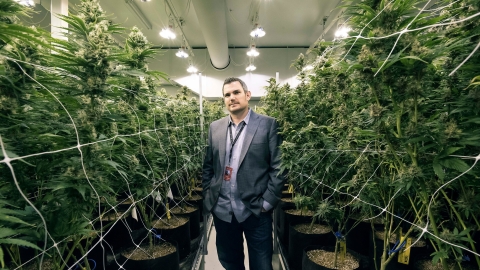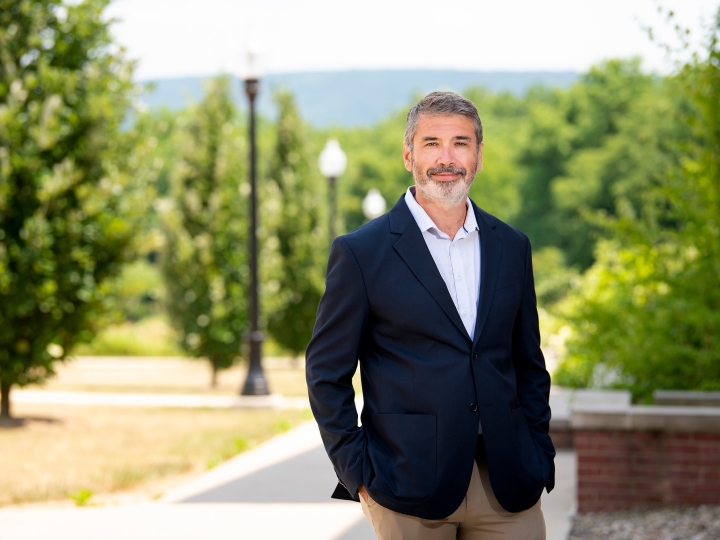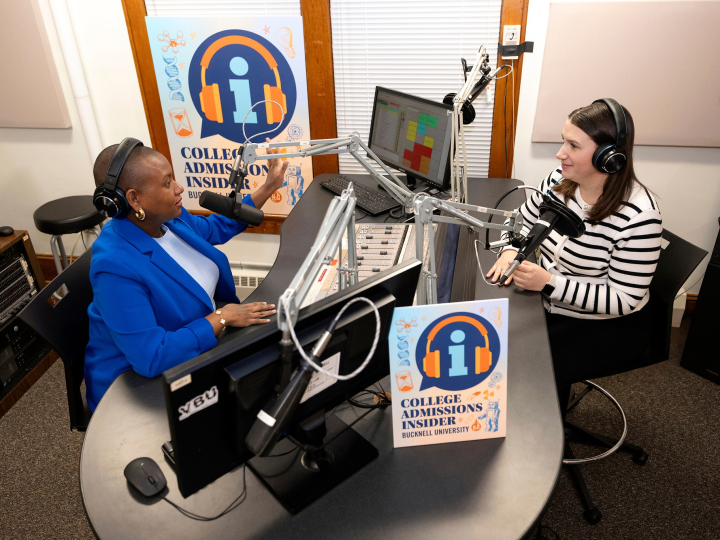
Legal and Lucrative
April 6, 2017
Josh Ginsberg '01 leads Denver-based Native Roots, which he calls "the largest legal cannabis company in the country." Photo courtesy of Native Roots
A Budding Business
Bill Roark '03 remembers the most pivotal moment in his legal career as the day he could have gotten fired.
An attorney for 10 years at a traditional, mid-sized law firm in the Philadelphia suburbs, he'd been watching as state after state legalized medical marijuana, and he could see that it would be coming soon to Pennsylvania. Because marijuana was (and still is) illegal under federal law, "the industry was bringing unique legal challenges that stimulated my intellectual gene," he says.
Knowing that "anyone who wants to get in the business needs a good lawyer," he went to his firm's managing partner with a most unconventional, entrepreneurial pitch: He wanted to make himself the firm's specialist in this still illegal, but rapidly growing field.
"It was a scary day," he says, but he'd done his homework, talking to attorneys in other states. And it wasn't as if his idea would strike his colleagues as totally out of character — Roark has a bobble head of Jerry Garcia on his desk, and his ringtone is a Grateful Dead tune.
"I did a five-minute sell and held my breath," Roark says. "I could have been told to pee in a bottle and clean out my desk."
Instead, the managing partner was open-minded — "all credit to him," Roark says — and "I got the green light to go full bore." Two years later, Pennsylvania has approved limited medical marijuana use, and Roark's new specialty is "keeping me busier than I ever could have imagined," accounting for some 80 percent of his workload. Besides advising newly forming businesses, he helps educate local government officials and other lawyers about how Pennsylvania's new medical-marijuana law works.
Pete Kadens '00 is one of those marijuana entrepreneurs who needs lawyers to help navigate this complex, uncertain but rapidly growing field of business.
He's CEO of GTI, one of the country's leading legal marijuana operations, with licenses to grow or sell it in Illinois, Nevada, Massachusetts, and Maryland.
Before joining GTI, Kadens was already a successful businessman. He'd helped build a solar energy company into a $100 million operation, which he eventually sold, leaving him to look for a new challenge. As he explained in a TEDx talk at Bucknell last May, he has long been outraged at the way the war on drugs has targeted minorities and the poor.
"Their criminal history plagues them the rest of their lives," he says, often forcing them into homelessness, a cause that Kadens has been passionate about since he was a young child, when his parents took him on a round-the-world trip, and he saw children his own age living in "utter squalor."
When Kadens was approached by a friend in the medical-marijuana business, he saw it as an opportunity to do well by doing good. He could help patients who weren't being effectively treated by traditional medical care, while helping break what Kadens sees as the stigma surrounding marijuana use. He even hopes to create jobs for those victimized by the war on drugs. Being a marijuana entrepreneur and legalization advocate, he says, "is my new purpose in life."
The Starbucks of Weed
When visiting a Native Roots store in Colorado, where both recreational and medical marijuana is legal, shoppers may do a double take and wonder if they mistakenly stepped into an expensive jewelry shop.
The store is bright and spacious, with the wares displayed in glass cases and elegantly staged in tall shelves behind the counters. It's high class all the way.
Native Roots CEO Josh Ginsberg '01 wants to banish the image of the marijuana shop as some dingy stoner hangout.
"We're kinda trying to create an Apple/Starbucks type model," Ginsberg says. The vibe they're after is "clean cut," but also "really cool, really hip."
Shoppers will know it's a Native Roots store when they see its signature feature — white walls covered chock-a-block with typographically varied, bold, black names of favorite marijuana strains. "There's something for everybody in that wallpaper," Ginsberg says.
Native Roots is "the largest legal cannabis company in the country," he says. In early 2017, the company that he and two other partners own had 17 stores, a 200,000-square-foot, state-of-the-art indoor growing warehouse, and nearly 700 employees, with three more stores due to open this spring.
He dove headfirst into the business after seeing the 2009 U.S. Department of Justice memo basically saying the feds would not crack down on state-legalized medical-marijuana operations. "It was a no-brainer to put all my eggs in this basket," he says. "You get to sell weed legally. How can that not make sense?"
Ginsberg and his wife scrounged every scrap of money they could from their existing small business ventures, their personal lines of credit, and even their parents. "It was a battle for about the first two years," he says, as he struggled to find a reliable grower who'd supply high-quality product. He was near bankruptcy and driving a borrowed truck because he didn't have money to buy a car. "But things turned around, and it's just been blazing toward the moon since then," he says.
Roark, the Pennsylvania medical marijuana attorney, says of Ginsberg, "He's boss hog. He's one of the top entrepreneurs in one of the busiest states."
Risky Business
Legal marijuana is a big and growing business — but it's not an easy business to be in.
Total sales of legal product were $6.9 billion in 2016, up 34 percent, according to a study by Arcview Market Research and reported in January by Inc.com, a business publication. And there is plenty of room to grow as more states loosen their laws. Arcview estimates that 87 percent of the marijuana business — another $46.4 billion — takes place in the black market.
However, "legal" marijuana is "at best quasi-legal," says Mike Cindrich '02, a San Diego criminal-defense attorney who initially defended many medical-marijuana clients and has branched out to advise would-be marijuana entrepreneurs. "According to black-letter law, it's illegal federally."
That makes it hard to find a bank that will handle marijuana money. The Obama Administration issued a written enforcement policy allowing banks to serve marijuana businesses, provided they file detailed reports showing that the money comes from state-legalized operations — a directive the Trump Administration could easily reverse. Kadens says that only 3 percent of banks in the country will even agree to open accounts for marijuana businesses.
Bank loans simply aren't available, so to get into the business, entrepreneurs rely on private financiers. "The financing can be very creative," says Brian Kozel '98, a Colorado CPA who works with businesses in the marijuana industry.
Competition for a license to sell legal marijuana is fierce, as Kadens well knows. He led an intensive effort to build strong community support for a proposed medical-marijuana grow house near Hagerstown, Md. His firm was awarded the necessary state license, but then Kadens watched helplessly as it was revoked, supposedly because too many had been awarded in that county. His firm did win a coveted retail-dispensing license for medical cannabis in the Washington, D.C., suburbs, and he hopes to open that location in the second half of 2017.
All in all, the legal marijuana business is "two times harder than you think and three times more expensive if you want to do it right," Kadens adds. "You have to have a lot of internal fortitude."
And just because medical marijuana is legal doesn't mean it's easy to stay on the right side of the law. California legalized medical uses in 1996, but Cindrich says, "many local governments do not respect the California medical-marijuana laws." Admittedly, he says the laws are "vague and confusing," but "a lot of people were still being arrested." (California voters in November agreed to legalize recreational use, which should reduce the legal risks for most marijuana users.)
Since 2014, Congress has imposed a ban on spending federal money to interfere with the implementation of state medical-marijuana laws. However, some medical dispensaries are still in court, fighting federal charges that they've allowed nonmedical sales. The funding ban does not protect those selling marijuana for recreational use in states where that is legal.
Accountant Kozel notes another challenge: An antidrug provision of the U.S. tax code says if you're involved in illegal activity, you cannot deduct certain costs of that activity in calculating what you owe the IRS. "That produces much larger tax burdens" for state-licensed marijuana businesses, he says. "It can be cost-prohibitive."
"People are making money," Kozel says, but "the price out here [in Colorado] is actually plummeting." The advertised price of an ounce of flower product at retail shops, he says, has dropped to less than $100.
Hanging over everything in the business is the change that took place in the White House. While President Trump has supported medical marijuana and says he respects state's rights, according to Anthony Georgiadis '00, a partner with classmate Pete Kadens at GTI, "There's some concern because of his attorney general [Jeff Sessions]."
Cindrich notes that "Sessions is notoriously anti-marijuana." In late February, Trump's press secretary jolted the industry by suggesting the Justice Department would no longer take a hands-off approach to enforcing federal law in states that have legalized recreational marijuana.
Still, says Cindrich, "I'm optimistic. Trump is a businessman, and there's an economic opportunity here," with 28 states allowing medical use and full legalization in eight, and probably more on the horizon. "It's going to be really hard to turn back what has been done," he says.
Does marijuana work as medicine?
Federal law treats marijuana as a Schedule I controlled substance, meaning it has "no currently accepted medical use and a high potential for abuse," according to the U.S. Drug Enforcement Administration. That puts marijuana in the same fully outlawed class as heroin, treated as more dangerous than cocaine, opiates and even methamphetamine, all of which have some federally accepted medical use.
By contrast, 28 states have heeded pleas from those who insist marijuana can help them. Cancer patients fighting nausea or loss of appetite want it. People in chronic pain, fearful of getting addicted to opioids, want it. Parents of children with otherwise untreatable epileptic seizures insist that a key medically active ingredient in marijuana — cannabidiol, or CBD — is the only thing that helps their kids.
Ronald Aung-Din '70, one of two neurologists in Florida authorized to prescribe medical marijuana, treats a growing number of patients — 130 and counting — on the state's medical-marijuana registry. Thanks to marijuana's more-benign pain-relieving properties, he says, "I have patients who are getting off narcotics and are getting their lives back."
He also treats patients for a wide range of conditions using a patented technique he has pioneered — applying a topical cream form of cannabidiol that's derived from hemp rather than the cannabis plant, so the product is fully legal. "CBD is not psychoactive and relieves convulsion, inflammation, anxiety and nausea," he wrote in an article for the June 2016 issue of Drug Development and Delivery.
A new federal study validates some of what patients and physicians such as Aung-Din are saying. In a comprehensive review of existing research, the U.S. National Academies of Sciences, Engineering and Medicine found strong evidence that marijuana is helpful for chronic pain in adults, nausea in cancer patients and muscle spasms in multiple sclerosis patients. Marijuana may be helpful for several other conditions, the federal review found, but the evidence is weaker.
The National Academies' review, however, found many downsides to wider marijuana use. Rates of accidental ingestion in children are higher in states where it's legal. When people are under the influence of cannabis, it's riskier to drive, and memory is impaired. Smoking marijuana can cause bouts of bronchitis (but does not appear to cause lung cancer). Those who use a lot of marijuana are more likely to abuse it or other harmful substances, among other potential harms cited in the federal study.
Food and Drug Administration Deputy Director Douglas Throckmorton told a congressional sub-committee last summer, "The [FDA] drug approval process remains the best way to identify new treatments that are safe and effective for patients," including those involving marijuana.
Medical-marijuana entrepreneur Kadens scoffs at that notion: "165,000 people have died from legally prescribed opiates since 1999. If science matters and research matters, where was science, and where was the research, with [the opiate painkillers] Vicodin and OxyContin?"
Critics claim "that clinical research really matters and protects people," Kadens says. While you can do stupid things that hurt yourself while under the influence, he says, "You cannot overdose on marijuana."
Supporters of medical marijuana say its health benefits would be better documented if strict federal drug law restrictions didn't make it so difficult to do needed studies. It's a view that gets some support in the National Academies' report. "Regulatory barriers," it says, "including the classification of cannabis as a Schedule I substance, impede the advancement of research."
Kadens and other supporters say that Canada and Israel are much farther ahead of the U.S. in researching the medical uses of cannabis. "Maybe the research doesn't exist in The New England Journal of Medicine, because we're not allowed to study it here," Kadens says. "There is productive research out there from reputable institutions," such as Israel's Weizmann Institute of Science.
An important question in this debate is what counts as evidence. A new federal law, The 21st Century Cures Act, passed late last year with broad, bipartisan support, revises the drug approval process and gives more weight to the experience patients have outside of traditional clinical research trials. Politically, passage of the law was an unusual case where large pharmaceutical companies and patient advocates worked on the same side, while drug industry watchdogs warned that the law will make it easier for harmful drugs to hit the market.
The National Academies' review gave ammunition to both sides of the medical-marijuana debate. While documenting some clear benefits, the review warned, "the growing acceptance, accessibility and use of cannabis raise important public health concerns."
Amy Wolaver, director of the Bucknell Institute for Public Policy, points out that in states where it is legal, there's evidence showing more adolescents use marijuana, while the rate of opioid overdoses goes down.
"No substance is perfectly safe and purely beneficial," Wolaver says. "There does seem to be some positive impacts for some patients. The question is how to get them access and minimize potential harms."
Scott Gerhardt '94 believes Aung-Din's hemp-based CBD treatment is a potentially revolutionary way to deliver many of marijuana's benefits, with fewer of the harms. Applied as a topical cream, CBD bypasses the lungs, bloodstream and digestive tract, where many troublesome side effects can arise. Under a licensing arrangement with Aung-Din, Gerhardt and some partners have launched a business to market Cannidex, a product that delivers a high dose of CBD in cream form.
Gerhardt, a former Marine, is especially happy to provide the product to his fellow veterans who are dealing with chronic pain or post-traumatic stress disorder.
"It feels very good to know we can help people in states where they might not have the same access as they do in Colorado and California," Gerhardt says.
From Home Decor to Cannabis
Anthony Georgiadis got into the legal marijuana business because of his Swiss Mountain dog. Around his first birthday, the family pet began having uncontrollable seizures. "A 130-pound animal who loses control of himself in the middle of the night — it's pretty scary stuff," he says. Conventional veterinary treatments offered no relief. In desperation, Georgiadis obtained some CBD.
"We gave it to our boy, and it worked," he says.
At the time, Georgiadis had been busy running one of the nation's largest home décor businesses, one he co-founded and that now produces thousands of mirrors and framed artworks a day. Seeing the power of CBD led him to start investing in marijuana businesses, and by 2016, he'd moved into full-time cannabis work. Joining classmate Pete Kadens as a partner at GTI, Georgiadis oversees the firm's Nevada operations and helps plot the company's overall business and financial strategy.
Friends since they lived on the same residence hall as first-year students, Georgiadis and Kadens also share a passion for changing the nation's drug laws. "We have big problems with the war on drugs and the harm that prohibition has caused in this country," Georgiadis says. "It just hasn't worked."
Cindrich, the San Diego attorney, agrees. In his spare time, he helps two groups working to end punitive marijuana laws, NORML and Law Enforcement Agents Against Prohibition.
The three Bucknell graduates have something else in common: All were in Kappa Delta Rho fraternity. So was Josh Ginsberg, the marijuana CEO in Colorado.
"Now we have four of us [KDR brothers] very involved in the industry. Don't ask me why," Georgiadis says. "It's probably not what folks at Bucknell expected of us.
"We all believe in what we're doing," he says, "not just from a business perspective but from a social perspective."
Explaining his shift into medical-marijuana law, attorney Bill Roark says attending Bucknell gave him the open mind, skill set and confidence to question the status quo and to work on "fixing things we didn't think were right." It's one of the reasons he — and other Bucknellians working in the legal marijuana field — see opportunity where others see a wall.
Sure, there's money to be made in the business, Georgiadias says, but that's only part of the appeal. "When you hear from patients about the medical benefits they're experiencing," he says, "it just makes it all worth it. What we do is very fulfilling."

